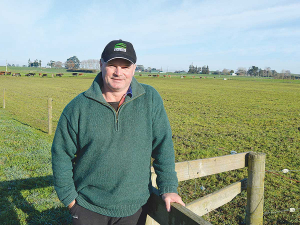Waikato dairy effluent breaches lead to $108,000 in fines
Two farmers and two farming companies were recently convicted and fined a total of $108,000 for environmental offending.
 Waikato farmer Andrew McGiven says the positive result reflects the great work farmers have been doing around environmental sustainability.
Waikato farmer Andrew McGiven says the positive result reflects the great work farmers have been doing around environmental sustainability.
Dairy farmers are getting positive reviews from regional councils when it comes to managing effluent on farms.
Waikato Regional Council is the latest local body to heap praise on the dairy sector after recording a significant drop in non-compliance.
Over the 2020/21 financial year, the council's rural compliance team monitored 1,172 farms. Of these, 81 (just 7%) were found to be significantly non-compliant, compared to the previous year when the council inspected 820 farms and found 102 (12%) with significant compliance issues.
"We call it as we see it, and we are very happy to say that our farm inspections over the last year show a significant drop in non-compliance relating to dairy effluent management in the Waikato," council regional compliance manager Patrick Lynch says.
"This year's results clearly indicate a real improvement, and we would like to acknowledge all of the hard work being carried out across the dairy sector to achieve this," says Lynch.
"The risk to the environment has undoubtedly been greatly reduced on individual farms by the investment in effluent infrastructure."
Waikato farmer Andrew McGiven says the positive result reflects the great work farmers have been doing around environmental sustainability.
"Looking at the water flowing through the creeks on my farm, I reckon you can see the improvements as well, even after heavy rainfall the water is still pretty clear, whereas normally it is very brown with sediment," McGiven told Rural News.
"It appears that farmers around the country have stepped up around effluent compliance and intensive winter grazing being two examples.
"It would be great to have these good news stories being promoted more through other media outlets, instead of the normal farmer papers."
McGiven says it's unfair that the sector is still being judged by the 1-2% who can't meet the required standards.
"Imagine if we judged society by the 2% who were criminals, or even better, all politicians on the 1-2% who can't meet the standards required by voters?"
Last month, a Tasman District Council survey of effluent management on the 124 dairy farms in the Tasman region gave thumbs up to farmers and dairy companies.
The survey dound 98% of farms fully compliant, 1% non-compliant and another 1% significantly non-compliant.
A council report says all farms that hold resource consents fully complied with all conditions of their respective consents. All farms in Tasman district were inspected at least once over the 2020-21 season.
The report says a considerable amount of work has been done since 2012 by the dairy industry - DairyNZ, Fonterra, and Westland Milk by working one-on-one with farmers with respect to system and wet weather contingencies.
"The council and industry are actively promoting to farmers the benefits of engaging professionals who have gained accreditation through the Farm Dairy Effluent Accreditation Scheme."
Arable growers worried that some weeds in their crops may have developed herbicide resistance can now get the suspected plants tested for free.
Fruit growers and exporters are worried following the discovery of a male Queensland fruit fly in Auckland this week.
Dairy prices have jumped in the overnight Global Dairy Trade (GDT) auction, breaking a five-month negative streak.
Alliance Group chief executive Willie Wiese is leaving the company after three years in the role.
A booklet produced in 2025 by the Rotoiti 15 trust, Department of Conservation and Scion – now part of the Bioeconomy Science Institute – aims to help people identify insect pests and diseases.
A Taranaki farmer and livestock agent who illegally swapped NAIT tags from cows infected with a bovine disease in an attempt to sell the cows has been fined $15,000.